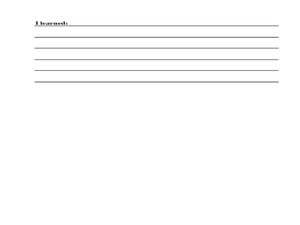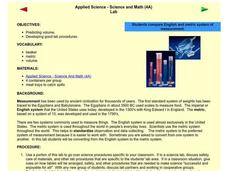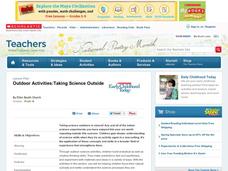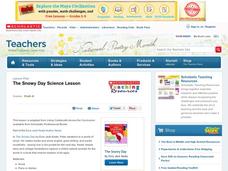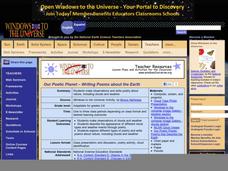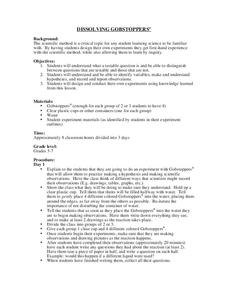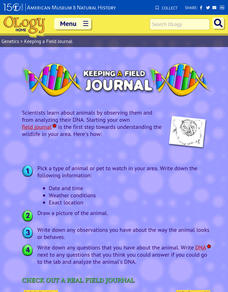Curated OER
How Can You Predict the Characteristics of an Unborn Baby?
Students compare three sets of unlabeled human chromosomes and gather related data, trace chromosomes to pair them, and make observations about them.
Curated OER
How Are Soils Classified?
Students list the three texture groups that classify soils. They classify a soil sample as sandy, silty or clay soil.
Curated OER
The Shape of Things
Sixth graders read and discuss information regarding the shape and attributes of an eggshell. In this shape of things lesson plan, 6th graders gather relevant information that pertains to the incubation and formation of an...
Curated OER
Presenting Powerful Outlines for Science Fair Reports
Students examine and reflect on the role of science reports in the larger scientific community and become familiar with one scientist's experience preparing a report. They identify key points to build a strong science report and create a...
Curated OER
Fun with Flowers
Students make observations of flowers. In this life science lesson, students look at flowers, then draw and color their favorite flowers. Lesson includes extension activities.
Curated OER
Changing States of Matter - Making Ice Cream
Students make ice cream as a result of viewing changes of states of matter. In this matter lesson plan, students learn how heating and cooling can effect a state of matter to change.
Coastal Carolina University
Osmosis and Diffusion Lab: Honey I Blew Up the Bear
Beginning biologists explore passive transport through two demonstrations and a hands-on inquiry. Spray air freshener from one spot in the classroom and have class members raise their hands as the scent reaches them. Also, place a teabag...
Foundation for Water & Energy Education
What is the Water Cycle? Activity A
Hydrologists create a concept map about how water is used and a sentence strip defining water and describing its unique properties. Small groups work together to fill a small milk carton and compute the mass of water inside. The next...
Curated OER
Applied Science - Science and Math Lab
Although it was written to use in a science class, this measurement instructional activity is adaptable to Common Core standards in math for measurement and data. Youngsters are introduced to two types of measurement systems. They...
Baylor College
Digestion
Digestion is an amazing and complicated process that provides humans with the energy they need to survive. Lesson six in this series on the science of food uses sliced turkey and a meat tenderizer to demonstrate how enzymes help break...
Curated OER
Making Gateway Middle School Handicapped Accessible
Students discuss the situation at their middle school about being handicapped accessible. In groups, they identify the various types of handicaps and their accommodations. They create a blueprint of the building and make suggestions in...
Curated OER
Outdoor Activities: Taking Science Outside
Students participate in various outdoor science activities to enhance their observation, classification, and analysis skills. In this outdoor lesson, students begin by observing a tree from a straightforward angle, then from the...
Curated OER
The Snowy Day Science Lesson
Students listen to the story The Snowy Day by Ezra Jack Keats in order to become interested in the world of snow. In this snow exploration lesson plan, students scoop up snow to make snowballs, measuring the amount of snow they use so...
Curated OER
Sink or Float
Second graders explore floating and sinking and make predictions about whether certain objects are likely to sink or float. They read the story Who Sank the Boat? by Pamela Allen. Pupils loacate rhyming words and discuss the events of...
Curated OER
In Touch with Apples
Students read "How To Make an Apple Pie and See the World", the story of a girl who traveled the world to find the ingredients to make her apple pie. They conduct a series of interdisciplinary activities including testing their senses,...
Curated OER
Our Poetic Planet - Writing Poems about the Earth
As a way to combine language arts and science, try this lesson on writing cloud poetry. Begin by showing a PowerPoint presentation and images of cloud types. Take meteorology masters outdoors to explore the sky using the provided "Cloud...
Cornell University
Plant Cell Crime Scene
Use science to solve the mystery of the Poplar murder. Pupils use forensic botany to determine if a suspect could be the killer. By analyzing images from a Transmission Electron Microscope, learners determine if the material found on the...
Curated OER
Dissolving Gobstoppers
Students design their own experiments . They study the scientific method and determine what a testable question is. They distinguish between questions that are testable and those that are not. They identify variables, make and understand...
Curated OER
Sunrise/Sunset
Third graders discovver what causes the dramatic colors of a sunset by seeing the changing color of light as it passes through a clear container of water to which milk is gradually added. They measure the liquids and observe what happens...
NASA
Raisin Bread Universe
What is the universal breakfast? The resource includes two activities, the first one observing oatmeal to understand the texture of the universe. Then, scholars measure raisin bread dough before and after it rises to represent the...
American Museum of Natural History
Keeping a Field Journal
Young scientists begin a field journal by following four steps. A real-world example of an entry showcases the different parts, including location, date, drawings, and more.
California Academy of Science
Notice and Wonder
Pint-sized zoologists practice the art of observation. They take notes, pictures or written, as they observe an animal for a period of time. This can be done at the zoo, with a visiting classroom animal, or perhaps at the humane society....
Curated OER
Using Your Marbles - Volume Measurement and Reporting
Demonstrate how to measure the volume of liquids and solids immersed in liquid to your class. They observe a teacher-led demonstration, and in small groups construct a data table that demonstrates how many marbles were used and the...
Curated OER
Agents of Erosion
Fourth graders observe and identify the effects of geological activities and weathering on Earth's surface. They also take a look at reports of events such as storms, earthquakes, floods, and volcanoes. There is a hefty hands-on activity...





